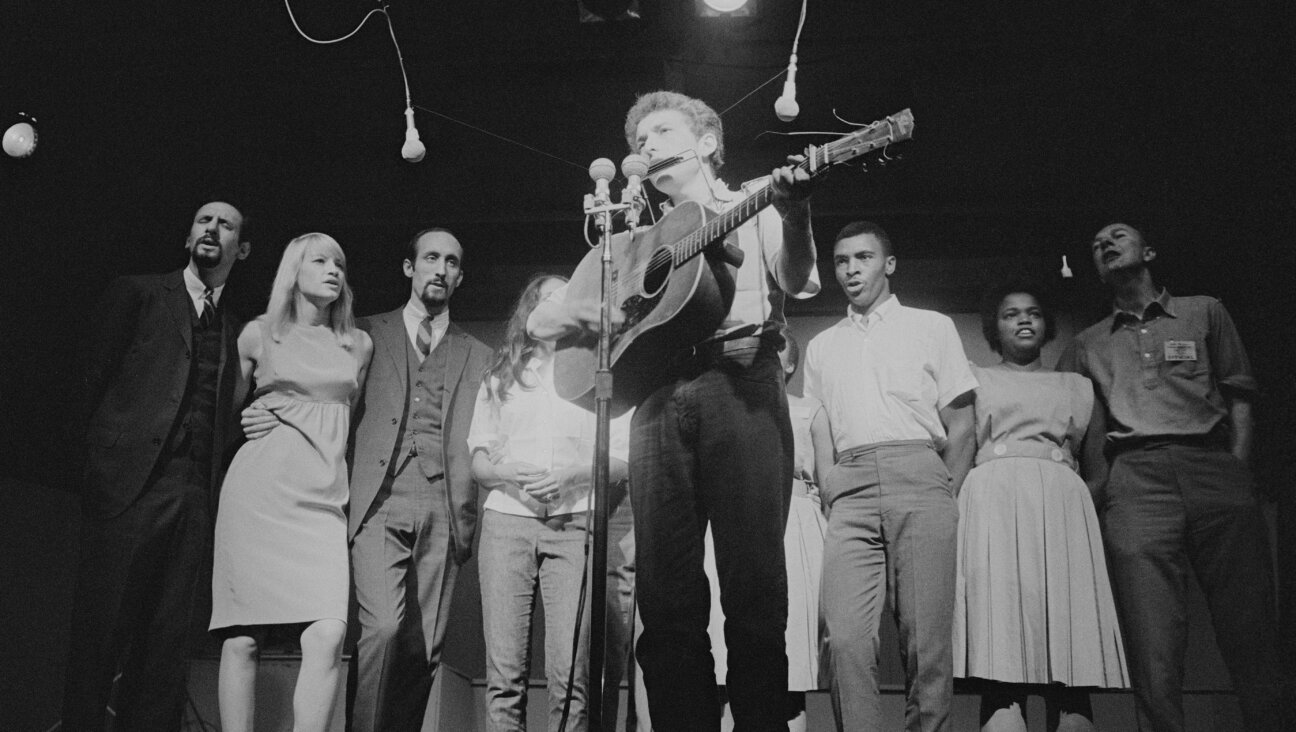When pop music’s fascination with Nazi symbols and history went way over the line

Sex Pistols on stage, 1978. By Getty Images
Inspired in part by all the Jewish artists on Rolling Stone’s list of the 500 Greatest Songs, the Forward decided it was time to rank the best Jewish pop songs of all time. You can find the whole list and accompanying essays here.
MAGA politicians and talk show hosts with the gall to compare mask mandates and COVID vaccinations to the Holocaust are one thing, but the recent rise of social media opprobrium has made the overt embrace of antisemitism in popular culture nearly unthinkable. Still, it was not too long ago that Nazi symbols, uniforms and names were casually invoked by musicians.
In 1970, Who drummer Keith Moon, already known for outrageous public pranks, found it good sport to dress up as Hitler and “Sieg Heil” his way around Soho to the consternation of Londoners who could vividly recall the Blitz. Bassist Steve Priest donned a similar costume when the Sweet performed on TV in 1973, but glam bands like the Sweet had already fetishized gender-bending fashion as a deliberate provocation; in the hopes of getting up people’s noses, he might just as easily have donned a nun’s habit. David Bowie once said some stupid things about Nazis and fascism; Bryan Ferry was more recently castigated for praising Nazi aesthetics.
Although the straight press and conservative activists might have been inflamed by John Lennon invoking Jesus as a measure of the Beatles’ popularity or the Sex Pistols cursing on television, fans of rock saw all that as fair game and were rarely shocked by rockers’ shock tactics. But times have changed, and what might have been shrugged off as tasteless nonsense then now seems like an ugly relic of unevolved thinking.
In the long history of rock music and the will to outrage, it took the punks to strip away the last veneer of good faith and decency. To declare oneself a punk in the 1970s and early ‘80s, social convention had to be trampled (preferably under Doc Martens boots), taboos had to be defied and pieties defiled. Brewed from a sloppy mixture of protest politics, teen angst, social alienation, hopelessness and beer, punk anomie found countless targets: education (Suburban Studs: “I Hate School”), work (The Clash: “Career Opportunities,”), parents (Angry Samoans: “My Old Man’s a Fatso”), politics (TSOL: “Abolish Government/Silent Majority”), religion (The Damned: “Anti-Pope”), royalty (Sex Pistols: “God Save the Queen”), cops (Black Flag: “Police Story”) and capitalism (Dead Kennedys: “Let’s Lynch the Landlord”).
As it became more difficult to shock an anesthetized media and public, the new wave barricade-stormers tried harder. Safety pins, razor blades, nudity, violence and phlegm became routine; a perverse fascination with serial killers, medical horrors, rape and scatology was normalized, unburdened by concerns that invoking such subjects might well (long before the term was used) “trigger” anyone. “The Ballad of TV Violence” on Cheap Trick’s first album had been a concert staple under its original Chicago mass-murderer title: “The Ballad of Richard Speck.” The Butthole Surfers paid a tribute of sorts to clown-artist-murderer John Wayne Gacy in the cover illustration of “Locust Abortion Technician.” Before becoming a horror film director, Rob Zombie wrote over-the-top lurid fantasies for his band White Zombie. None of us took this stuff that seriously, so it was easy to shrug off.
Rummaging around for tools to cause offense, some punks grabbed onto Nazism, and casual play in a Third Reich sandbox became more commonplace. Insensitivity unaccompanied by any effort to display prejudice or cause real harm ran rampant; none of it went beyond demonstrating a willingness to transgress.
Joy Division named themselves after a concentration camp term and used a Hitler Youth drawing on an EP cover. A Michigan musician dubbed himself Elvis Hitler. Punk-adjacent Nick Lowe sang “Little Hitler” about his manager; Elvis Costello wrote “Two Little Hitlers” about a feuding couple. Millions of Dead Cops declared “John Wayne Was a Nazi,” the Angry Samoans joked “They Saved Hitler’s Cock” and the Mr. T Experience noted that “Even Hitler Had a Girlfriend.” As late as 1999, Primal Scream released an enigmatic single titled “Swastika Eyes.”
Amid such blithe references, Jews generally went unmentioned, keeping overt antisemitism out of the lyrics. In the Ramones’ Mad magazine world, “Today Your Love, Tomorrow the World” (“I’m a shock trooper in a stupor, yes I am / I’m a Nazi schatzi, you know I fight for the fatherland”) was no more racist than “Beat on the Brat” was a genuine call to violence. (That said, guitarist Johnny Ramone espoused right-wing politics and collected Nazi memorabilia; he may have considered those lines differently than the band’s two Jewish members.)
Like most of the songs he wrote for the (ahem) Dictators, Andy Shernoff meant “Master Race Rock” as a good-natured goof. Sparks reasonably considered the discomfort of Jewish parents with wry sensitivity in “Girl from Germany.” And when the Dead Kennedys invoked the German national anthem in “California Über Alles,” it was only to criticize Governor Jerry Brown.
Still, some did engage in more pernicious expression. Whatever the intent, the Sex Pistols (whose manager was Jewish) definitely crossed a line in “Belsen Was a Gas” (“Belsen was a gas I heard the other day / In the open graves where the Jews all lay”). Siouxsie Sioux, who sported a Nazi armband early in her career, made no bones about her antisemitism: she sang “Too many Jews for my liking” in “Love in a Void” until her band got into a recording studio and changed “Jews” to “bigots.”
And it wasn’t only the bands. In England, the far-right National Front found skinheads, a culture infected by violence and racism, susceptible to their soccer hooligan appeal; their attendance turned concerts by working class punks like Sham 69 and the Cockney Rejects into dangerous battlegrounds. Those bands never espoused those values and had to contend with unwanted followers, unlike Skrewdriver, who came out as full-blown neo-Nazis. In America, the Dead Kennedys replied to homegrown skins with “Nazi Punks Fuck Off” (“You still think swastikas look cool / The real Nazis run your schools / They’re coaches, businessmen and cops / In a real Fourth Reich you’ll be the first to go”). In “You’re Tripping,” the never-PC Queers sang, “You suck / Motherf—ker / I hate white power / I hate your band / Can’t you see / This ain’t Nazi Germany? / Bring on the beers / ‘Cause we are the Queers!”
Meanwhile, overt antisemitism emerged at the fringes of heavy metal and in mainstream hip-hop. Ice Cube’s beef with N.W.A manager Jerry Heller and bandmate Eazy-E erupted in “No Vaseline”: “You let a Jew break up my crew” and “Get rid of that devil real simple / Put a bullet in his temple / ’Cause you can’t be the N***a 4 Life crew / With a white Jew tellin’ you what to do.” Dipping into dubious waters, Public Enemy’s blazing and brilliant “Welcome to the Terrordome” included these lines: “Crucifixion ain’t no fiction / So-called chosen frozen / Apology made to whoever pleases / Still they got me like Jesus.”
And then there’s Michael Jackson. Spurred by some personal animus (presumably not the Italian-American record executive he later called “a devil”), he went on the attack in a 1995 single, “They Don’t Care About Us,” creatively turning a racist slur into a verb: “Kick me, kike me, don’t you black or white me” and the more traditional usage of “Jew me, sue me, everybody do me.” His explanation, when Diane Sawyer asked him about it, was also traditional: “My accountants and lawyers are Jewish. My three best friends are Jewish: David Geffen, Jeffrey Katzenberg and Steven Spielberg.”
Ira Robbins co-founded Trouser Press magazine in 1974 and has been writing about popular music ever since.
Join us at 7:30 PM on Wednesday, Feb. 16, for a spirited discussion of the Greatest Jewish Pop Songs of All Time featuring Forward contributing editor and author Seth Rogovoy; executive editor Adam Langer; former Vibe and Spin editor-in-chief of Vibe, Alan Light; DJ and SirusXM host Hesta Prynn; novelist and screenwriter Jennifer Gilmore; and Forward contributing music critic Dan Epstein. Register here:
















